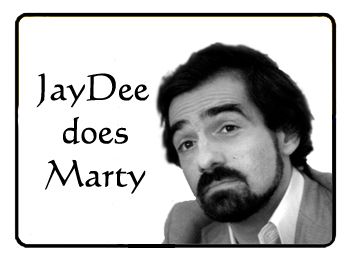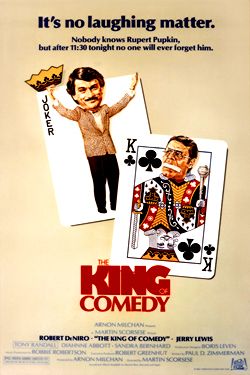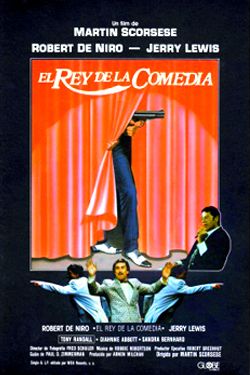Time for the second installment of
JayDee Does Marty. Now as the more eagle-eyed of you will notice I make reference at that start of the review to
After Hours.
After Hours was the second film I watched as part of the season but it didn't inspire a full review, instead a shorter one which will appear further down the line.
Year of release
2010
Directed by
Martin Scorsese
Written by
Laeta Kalogridis
Starring
Leonardo DiCaprio
Mark Ruffalo
Ben Kingsley
Michelle Williams
Max Von Sydow
Emily Mortimer
Shutter Island
Plot - In 1954, Federal Marshal Teddy Daniels (DiCaprio) and his new partner Chuck Aule (Ruffalo) travel to Shutter Island to investigate the disappearance of a patient from Ashecliffe Hospital for the criminally insane. The patient's name was Rachel Solando who had been sanctioned at the institute after she drowned her three kids. Teddy is a veteran WWII soldier, traumatized by his experience in the liberation of the Dachau concentration camp and the loss of his beloved wife in a criminal fire. Unable to access the records of employees and patients at Ashecliffe, he feels like his investigation is being obstructed by the facility's management, namely by head psychiatrist Dr. John Cawley (Kinglsey). While on the island Teddy suffers from several migraines and is laid up in bed as a storm engulfs the island, leaving Teddy and Chuck trapped. His interviews with the facility's patients lead him to the island's lighthouse where rumours of dark experiments run rampant. It is there that he will discover the mystery of Shutter Island.
I found Shutter Island to have the opposite appeal of After Hours. Early on and for a good long while I found myself really quite enthralled, but the longer the film went on the more I found my interest beginning to slowly wane away. On a technical level I think the film was made to the absolute highest of standards with the direction, sound and cinematography being stand-outs. Where I had problems was mainly with the story itself. The film is a psychological thriller that feels like it would be very much at home in the 50s or 70s, and I imagine would have thrived there. These days however it just feels a little bit old hat, and I think modern audiences are so trained in searching out twists that any mystery or shock value will be lost. In a way it reminded me of the David Fincher film, The Game. Like that film, Shutter Island sets up a very intriguing premise but just starts to crumble a little under the sheer incredulity of it all.
Where the film really suffered I personally felt was in the script. Too much of it was just too obvious and telegraphed to really have me on the edge of my seat. And I began to find it a slightly frustrating experience with the story taking us and the characters round in circles, with what felt like a lot of repetition. Now that worked in the sense of making the characters feel like they were rats in a maze and keeping them disorientated, but for me it just hurt the momentum and I felt my interest waning on occasion. I just thought that in the end the film was overlong and a touch heavy on dialogue; some scenes really did suffer from being overtalky in attempts to spell everything out. Even with the weaknesses of the story however I felt that Scorsese certainly did his best to retain what mystery there is, creating a very ghostly and spine-tingling tone. While the twist and plotting may have been obvious, he made the unravelling of the mystery interesting enough that it didn't completely fall apart.
And given the subject matter he had to work with, I think that Scorsese does a really quite excellent job. In conjunction with Robert Richardson's cinematography the film's imagery is frequently very striking and haunting. Right from the opening frames you can just tell that you're in for a treat on that front. As the island looms into view out of the thick fog we are instantly presented with this bleak and foreboding spectre. From there Richardson delivers a masterclass in cinematography, building a great sense of dread and paranoia. As one of the characters says, “there's a storm coming.” Where the visuals truly astonish however are in Daniels' flashbacks and dreams, scenes which are just incredible snatches of filmmaking. There is one dream sequence in particular that really wowed me, it seems Daniels hugging his wife as ash falls from the sky all around them, covering everything in their home like a fine dusting of snow. As their embrace continues, his wife herself turns to ash and crumbles through his arms. As well as just being a striking visual, the cinematography here really draws your attention as it is so different from the rest of the film. Whereas everything else is very grim and disquieting, the colours here are so bold and vivid. At that point the film very much evoked memories of the Hitchcock classic Vertigo. And it wasn't the only occasion where I got those feelings.
Film Trivia Snippets - Shutter Island was originally commissioned as a directing vehicle for Wolfgang Petersen. To fit more closely to Petersen's style however, considerable modifications were made to Dennis Lehane's novel in order to create a more action-driven blockbuster. When that fell through another director who was considered was David Fincher. /// When it came to creating the mood for the film, one of the main inspirations for Scorsese were the 1940s zombie movies of Val Lewton. While to give his actors an idea of how the film would look stylistically, Martin Scorsese screened both Out of the Past and Vertigo for the cast and crew. /// Before they settled on Mark Ruffalo, Leonardi DiCaprio and Martin Scorsese also considered both Robert Downey Jr. and Josh Brolin for the role of Chuck Aule. /// The movie's $40.2 million opening weekend take in the United States marked a career best for Scorsese. It went on to gross over $293 million worldwide, making it the highest grossing film of his career. /// Shutter Island was originally scheduled for release on the 2nd of October, 2009 so that it would be in contention for the Oscars. Paramount postponed the film however because their remaining yearly marketing and Oscars campaigning budget could not afford the required $50-60 to promote the film in addition to Up in the Air and The Lovely Bones. /// The traumatic killing of the Nazi guards at Dachau concentration camp that is depicted in the film is a historical event, taking place on 29 April 1945 when the camp was liberated by the US Army.
Quite often I got the sense that
Shutter Island was almost Scorsese's homage/tribute to the Master of Suspense. Alongside the use of colour the whole mood is that haunting, claustrophobic tone that Hitchcock often created, while instead of going for a series of cheap jump scares the film is more interested is building a sense of suspense and tension. Even the way it's shot evokes Hitch at points I felt with sweeping and rotating shots, extreme close-ups and its use of lighting. I loved how Scorsese set the scene at the asylum. As the characters enter the imposing facility the camera moves into an almost first-person point of view, placing us firmly in the position of the characters, really making us feel the sense of dread of the place. And then when they make it through the gates all of the inmates faces are so grim and menacing that it sends a chill down the spine. Oh and Ward C! Man that was one creepy, f*cked-up rats maze of a place. Scorsese just makes the whole place so damn eerie.
Another strong element I thought was its sound design. Its score was quite an interesting concoction. In many ways the music was actually quite minimal, heightening the level of realism and refusing to give the viewer any refuge from the awkwardness and claustrophobia of the situation. When the music does kick in however it is very brooding, ominous and overpowering. The union between the two creates a rather unbalanced experience, one that works well with the film's subject.
The highlight of the film for me was another very strong performance from Leonardo DiCaprio, quite the powerhouse as Edward Daniels. Initially starting off as very aggressive, intense and confrontational, as the film progresses we see more to his character, coming across as this damaged, scarred individual racked with guilt. He takes this character that starts off seemingly in complete control, and before long has taken him to the edges of his sanity. While this is certainly DiCaprio's show, the acting in Shutter Island is pretty damn strong throughout the whole ensemble. As his partner, Mark Ruffalo may not have a whole lot to do other than be a side-kick and just give Leo someone to bounce off of, but it's a sign of his ability that despite this he is still able to make an impression as the sardonic Chuck. As Dr. Cawley, the institute's lead psychiatrist and in Daniels' eyes the mastermind behind the whole conspiracy, there's the considerable presence that is Sir Ben Kingsley, bringing a very assured and enigmatic quality to the character. In fairly minor roles I thought that both Michelle Williams and Emily Mortimer both came off strong. I'd like to single out Mortimer in particular. I've got to say that between this, "The Newsroom" and Lars and the Real Girl I am really becoming quite a big fan of Mortimer. And the fact that I find her adorable certainly doesn't hurt. Oh and lastly, can Max von Sydow please make more movies? I know he's in his 80s now I believe and I don't know what his general health is like, but if he is able to I'd love to see him on the screen more. Even in such a minor role he just brings such great gravitas and sense of character to his ghoulish Dr. Naehring. He's someone that you just can't help but pay attention to when he pops up.
Conclusion - I know that there are a number of people who rather love this film but I just didn't quite make it to that level of appreciation. That was largely as a result of what I found to be a fairly underwhelming and predictable narrative. Perhaps my expectations weren't quite right. I was expecting an intelligent psychological thriller, instead it was more of a pulpy, B-movie genre film. And on those terms it was good fun. The shortfalls in the script were certainly made up for by the superlative efforts of Scorsese and Richardson who crafted a beautiful looking filming of great atmosphere and paranoia.
PS - The rating I gave this film came about instantly after I finished watching the film, which was probably a couple of months ago now. Looking at it now I wonder if I was a little harsh on the film, with the disappointing conclusion sabotaging the rest of the film. With some more time now passed I feel it could perhaps be a little higher. And on a future viewing it may well be.






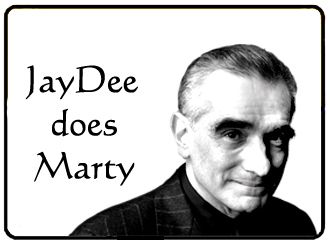
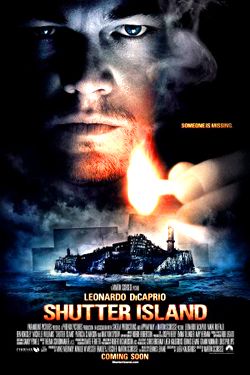
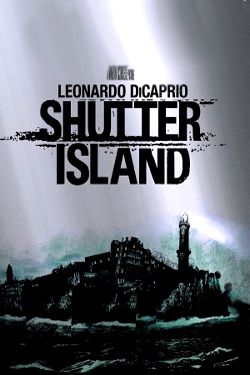
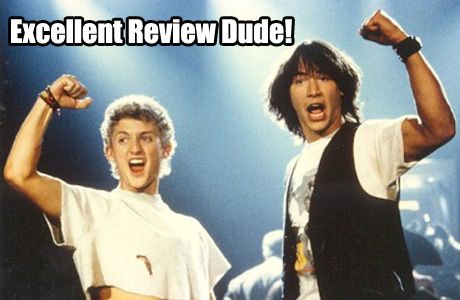
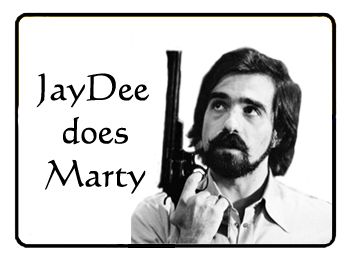
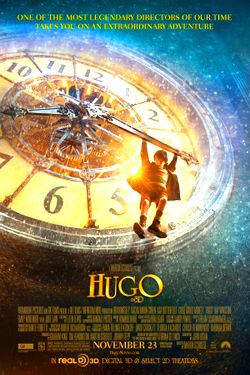
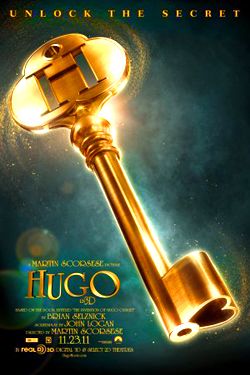
 In what sense is your wow to be taken?
In what sense is your wow to be taken? 
